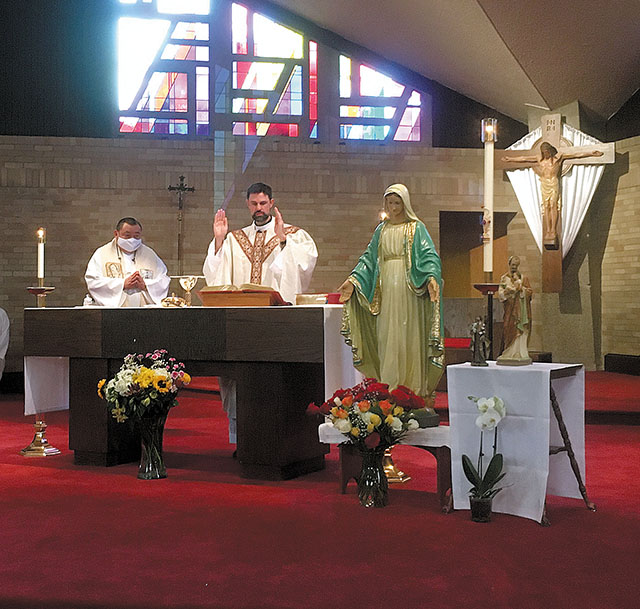
MADISON — In recognition of the patron saint of its St. Joseph Church, Good Shepherd Parish in Madison celebrated the feast of St. Joseph the Worker on May 1 at a bilingual Mass.
The parish, which also includes St. James Church and School near Meriter Hospital, includes a Latino ministry at the St. Joseph site.
Cynthia Schoettler, parish nurse, and Denice Jimenez, associate Latino minister, greeted attendees as they entered the church.
Fr. David Carrano, pastor, celebrated the Mass with Fr. Manuel Mendez, parochial vicar.
Spanish and English-speaking lectors and commentators participated in the Mass.
Merta Maaneb de Macedo, folk choir director, led the music with bilingual parish musicians.
Fluent in Spanish, Father Carrano spoke in both English and Spanish throughout the Mass, including the homily.
He began his homily by saying, “United as a community of believers from different parts of the world, different cultures, yet one in the Lord, one in our Catholic faith. St. Joseph is the universal patron of the Church, hence we all rightfully claim him as our own.”
Parishioners received a special invitation to celebrate the Year of St. Joseph at this Mass.
Pope Francis declared the special year last December 8 on the Feast of Immaculate Conception in his letter Patris Corde.
The letter marks the 150th anniversary of Blessed Pope Pius IX’s declaration of St. Joseph as Patron of the Universal Church.
In releasing the letter, Vatican News said, “The Holy Father wrote Patris Corde against the backdrop of the COVID-19 pandemic, which, he says, has helped us see more clearly the importance of ‘ordinary’ people who, though far from the limelight, exercise patience and offer hope every day. In this, they resemble St. Joseph, ‘the man who goes unnoticed, a daily, discreet, and hidden presence,’ who nonetheless played ‘an incomparable role in the history of salvation.’”
In his homily, Father Carrano focused on two points from the letter: Embracing our weaknesses and the dignity of human labor.
Embracing our weakness
Pointing out that Joseph “was the only sinner in the Holy Family,” Father Carrano said, “Joseph is an image of the tender father because he knows his own weakness in the light of the Heavenly Father’s love. He let God operate through his weakness.”
Reading from the papal letter, Father Carrano continued, “The history of salvation is worked out ‘in hope against hope’ (Romans 4:18) through our weaknesses. All too often, we think that God works only through our better parts, yet most of his plans are realized in and despite our frailty.
“Tenderness is the best way to touch the frailty within us. Pointing fingers and judging others are frequently signs of an inability to accept our own weaknesses, our own frailty . . . Only tender love will save us . . . That is why it is so important to encounter God’s mercy, especially in the Sacrament of Reconciliation, where we experience his truth and tenderness.”
Dignity of work
Regarding the dignity of work, Father Carrano said, “St. Joseph was a working father. His daily labors to provide for the Mary and Joseph were the practical way that he could demonstrate his love for God and his love for his family.”
Quoting from the papal letter, the pastor read first in English and then in Spanish: “Work is a means of participating in the work of salvation, an opportunity to hasten the coming of the Kingdom, to develop our talents and abilities, and to put them at the service of society . . . A family without work is particularly vulnerable to difficulties, tensions, estrangement, and even break-up. How can we speak of human dignity without working to ensure that everyone is able to earn a decent living?
“Working persons, whatever their job may be, are cooperating with God himself, and in some way become creators of the world around us. The crisis of our time, which is economic, social, cultural, and spiritual, can serve as a summons for all of us to rediscover the value, the importance, and necessity of work for bringing about a new “normal” from which no one is excluded. St. Joseph’s work reminds us that God himself, in becoming man, did not disdain work.”
Humble acceptance
Father Carrano concluded his homily: “In today’s world, as always, we have two ways of responding to our weaknesses and deficiencies as individuals, as a Church, and as a society. With humble acceptance of the will of God, or with disdain that leads to disappointment with life. The first permits us to find ways to make a meaningful contribution to the world. The second ends in us finding all of our efforts to be wasted. Humble St. Joseph, teach us how to embrace the call God has given to each of us, weak as we are, and to work for the Kingdom of your Son, Our Lord Jesus Christ.”
With the close of Mass, Father Carrano invited parishioners to a meal prepared by the parish fellowship commission and Latino ministry.
With safe distancing and mask-wearing, he encouraged parishioners to meet at least two new people before leaving church.

